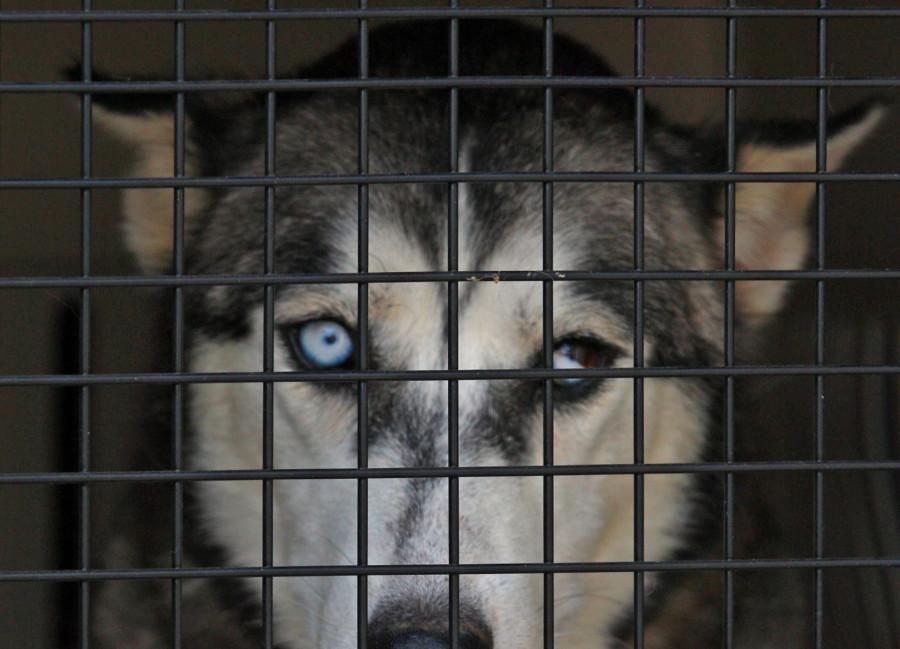Puppy mill awareness in Iowa
A dog waits his turn to be unloaded as hundreds of neglected dogs from a puppy mill in Montague County were relocated to a warehouse in the Stockyards in Fort Worth, Texas, Tuesday July 7, 2009. (Ron Jenkins/Fort Worth Star-Telegram/MCT)
Dec 3, 2015
Behind the playful exterior of puppies you see in pet stores may lie a dark past.
Their parents may have been subjected to abusive commercial breeding facilities called “puppy mills.” In these facilities, dogs often live in dishwasher-sized wire cages that allow for fecal matter to fall away. In addition, these dogs rarely see the light of day and experience little to no human contact.
On Saturday, Nov. 14, Iowa Friends of Companion Animals (IFCA) hosted an informational meeting about Iowa puppy mills. The event was held at 2 p.m. at the Cedar Falls Public Library. The meeting was organized by Jen Brucher, the area advocacy team leader for IFCA.
“What we want to do is make people in this area aware of the puppy mill issue, why the laws need to be changed and how they can help accomplish this,” Brucher said.
According to their website, IFCA is an “Iowa-based and Iowa-focused all-volunteer organization working to get better protection for dogs in Iowa’s commercial breeding kennels.” The organization was founded in 2008 by Mary LaHay, who is also the current board president. She served as the guest speaker at the IFCA event on Saturday.
LaHay’s presentation covered issues in the dog breeding industry and offered ways to help. In addition to discussing industry statistics, she shared anecdotal evidence — often accompanied with disturbing images of neglected dogs — that stressed the horrific nature of puppy mills.
The IFCA website defines a puppy mill as “a commercial facility where dogs are kept and bred in large numbers to provide puppies to the pet trade. The puppies may be sold to pet wholesalers or brokers, retail pet stores or directly to the public.”
According to brochures provided by IFCA, there are currently more than 200 United States Department of Agriculture (USDA) licensed dog-breeders in Iowa — the second most in the nation.
Among these licensees, over half keep more than 50 dogs, while some breed upwards of 400.
These facilities must adhere to the regulations dictated in the federal Animal Welfare Act, which the IFCA deem inadequate and often difficult to enforce. USDA inspectors often end up citing more than 50 percent of Iowa’s large-scale breeding facilities for violations like lack of shelter and veterinary care.
Due to the living conditions these dogs are subjected to, many of the puppies have significant temperament and health issues, the most common of which are eye and tooth related problems.
LaHay said that, although the puppies bred in these facilities may appear fluffy and cute in pet stores around the country, they can contract diseases from their mothers, which can lead to thousands of dollars of veterinary bills for pet owners.
According to IFCA brochures, of the top four dog-breeding states, Iowa is the only one without state oversight. This means that the Iowa Department of Agriculture doesn’t inspect USDA-licensees as they do for hobby breeders.
Earlier this year, IFCA proposed a bill in an effort to improve the state of Iowa’s dog breeding industry.
The changes sought in the bill were mandated state inspections, seller disclosure, a remediation fund, increased fees to cover costs and a special status for small breeders of up to three litters that would include decreased fees.
The bill received opposition from USDA-licensees and agribusiness. It ultimately was not passed. However, according to LaHay, IFCA plans on proposing the same bill with a few minor adjustments in January of 2016.
LaHay outlined several ways to help IFCA’s cause, which include joining one of the organization’s area advocacy teams, donating and becoming an informed consumer.
“The most important thing is to be careful about how you acquire a pet,” LaHay said. “We always advocate for rescuing from a shelter or a rescue. If you do buy a puppy, you absolutely have to meet the mother and see where she lives.”
Becoming an active supporter of the group’s proposed legislation was also emphasized.
“Know who your legislators are. Write to them and call them. Be informed as to the legislation that is coming up this spring in the House and Senate,” Brucher said.
UNI sophomore Emily Yen only recently learned of the extent of Iowa’s puppy mill issue.
“I believe that [puppy mills] are a legitimate problem because animals do have the ability to feel pain,” Yen said. “And we shouldn’t put something that can feel pain in a situation like that.”









